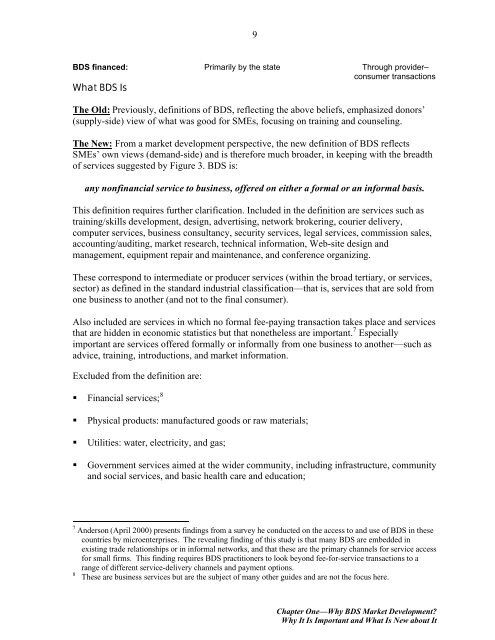BDS market development guide.pdf - PACA
BDS market development guide.pdf - PACA
BDS market development guide.pdf - PACA
You also want an ePaper? Increase the reach of your titles
YUMPU automatically turns print PDFs into web optimized ePapers that Google loves.
9<br />
<strong>BDS</strong> financed: Primarily by the state Through provider–<br />
consumer transactions<br />
What <strong>BDS</strong> Is<br />
The Old: Previously, definitions of <strong>BDS</strong>, reflecting the above beliefs, emphasized donors’<br />
(supply-side) view of what was good for SMEs, focusing on training and counseling.<br />
The New: From a <strong>market</strong> <strong>development</strong> perspective, the new definition of <strong>BDS</strong> reflects<br />
SMEs’ own views (demand-side) and is therefore much broader, in keeping with the breadth<br />
of services suggested by Figure 3. <strong>BDS</strong> is:<br />
any nonfinancial service to business, offered on either a formal or an informal basis.<br />
This definition requires further clarification. Included in the definition are services such as<br />
training/skills <strong>development</strong>, design, advertising, network brokering, courier delivery,<br />
computer services, business consultancy, security services, legal services, commission sales,<br />
accounting/auditing, <strong>market</strong> research, technical information, Web-site design and<br />
management, equipment repair and maintenance, and conference organizing.<br />
These correspond to intermediate or producer services (within the broad tertiary, or services,<br />
sector) as defined in the standard industrial classification—that is, services that are sold from<br />
one business to another (and not to the final consumer).<br />
Also included are services in which no formal fee-paying transaction takes place and services<br />
that are hidden in economic statistics but that nonetheless are important. 7 Especially<br />
important are services offered formally or informally from one business to another—such as<br />
advice, training, introductions, and <strong>market</strong> information.<br />
Excluded from the definition are:<br />
• Financial services; 8<br />
• Physical products: manufactured goods or raw materials;<br />
• Utilities: water, electricity, and gas;<br />
• Government services aimed at the wider community, including infrastructure, community<br />
and social services, and basic health care and education;<br />
7 Anderson (April 2000) presents findings from a survey he conducted on the access to and use of <strong>BDS</strong> in these<br />
countries by microenterprises. The revealing finding of this study is that many <strong>BDS</strong> are embedded in<br />
existing trade relationships or in informal networks, and that these are the primary channels for service access<br />
for small firms. This finding requires <strong>BDS</strong> practitioners to look beyond fee-for-service transactions to a<br />
range of different service-delivery channels and payment options.<br />
8<br />
These are business services but are the subject of many other <strong>guide</strong>s and are not the focus here.<br />
Chapter One—Why <strong>BDS</strong> Market Development?<br />
Why It Is Important and What Is New about It














